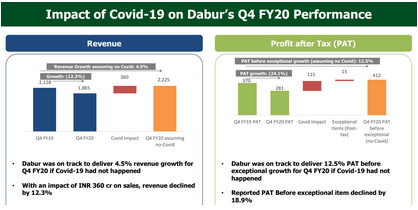NEW DELHI: Covid2019 came as a big disruptor for the marketing and advertising industry. All the brands, big or small, had to rework their strategies for the year, realign their spends, and work with a different approach to reach to the consumers. In a live webinar with Indiantelevision.com, Dabur India head of media Rajiv Dubey had revealed that the brand was quite proactive in its approach to handle the situation and now in its financial review, the company has detailed the many measures it took to manage Covid2019.
As per the report, the company worked on a multi-pronged strategy to handle the situation, keeping a tight focus on employee well-being, consumer marketing reorientation, GTM approach, streamlining manufacturing, cost and cash flow management, and community welfare.
Elaborating more on the facet of consumer marketing reorientation, the company shared in the report that all its communications were repurposed in the Covid2019 context and a higher focus was put on healthcare and hygiene. The company also entered into newer categories and launched relevant NPDs.
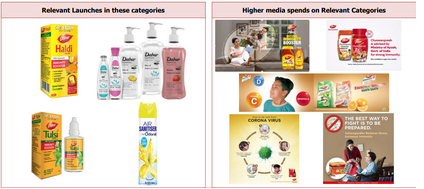
The media mix was retooled with an increased digital presence and clocking higher engagement on social media. It also decreased its presence on GECs, stopped advertising on print and outdoor, and invested highly in news channels, kids’ channels and movie channels on TV.
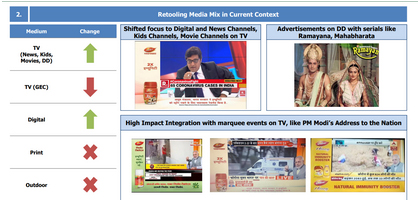
To reach the consumers, a go-to-market (GTM) strategy was adopted under which incentive schemes for the salesmen and delivery personnel were announced in the early-Covid period. Automation was made a key factor in taking orders by enabling SSMs to telecall and take order on SFA, directly from home at start of Covid, piloted order taking through WhatsApp & centralized tele-agents was also introduced. It also launched a retailer app, which is now reaching to close to 40,000 retailers for self-service.
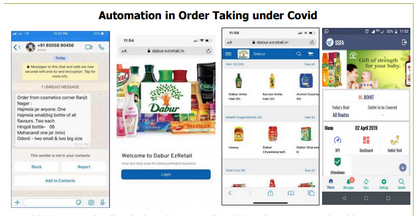
To motivate and support the retailers, the company rolled out one lakh ‘Suraksha Stores’ with the ministry of consumer affairs, provided health insurance of one lakh to 1500+ SSM of Dabur stockists and gave digital certificates for exceptional service by sales team members.
It also ventured out to reach the consumers directly via partnering with platforms like Swiggy and Dunzo, starting the ‘Immunity to Doorstep’ initiative, and placing Dabur's Immunity booster products in dairy and kirana stores.
Dabur also initiated several community welfare programmes, earmarking Rs 21 crores towards support and relief activities. It also contributed Rs 11 crore to PM care fund by Dabur and other group entities.

However, the company did not stay immune to the ripple effects of the pandemic. The month of April and part of May 2020 saw complete lockdown which led to a significant impact on the company’s revenue but with the easing of restrictions, we are seeing sequential improvement in the revenue trajectory of the company.
While the impact on revenue from operations has been partially mitigated by higher focus on health and hygiene categories, the launch of new products, driving sales through new channels such as delivery platforms and e-commerce and aggressive monitoring of sales in GT channel, yet the impact of Covid-19 on Q1 FY21 revenue from operations (based on best judgment and normal growth scenario) is likely to be in the range of Rs 400-450 crore. Impact on PAT of Q1 FY21 is likely to be in the range of Rs 60-80 crore.
It revealed in its performance summary for FY’20 that it was on track to deliver six per cent revenue growth if the pandemic had not happened. With an impact of Rs 360 crore on sales, its revenue grew by only two per cent in FY’20. Even the growth in PAT before exceptional items dipped to 5.8 per cent from 14 per cent.
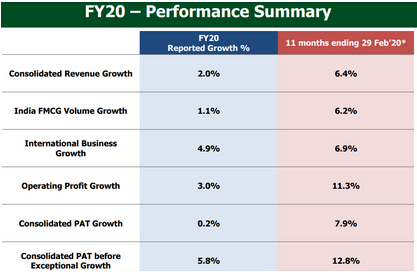
The Q4 was massively hit by the ripple effects of the lockdown. Dabur’s revenue dipped by 12.3 per cent in the final quarter and the PAT before exceptional items witnessed a dip of 18.9 per cent.
